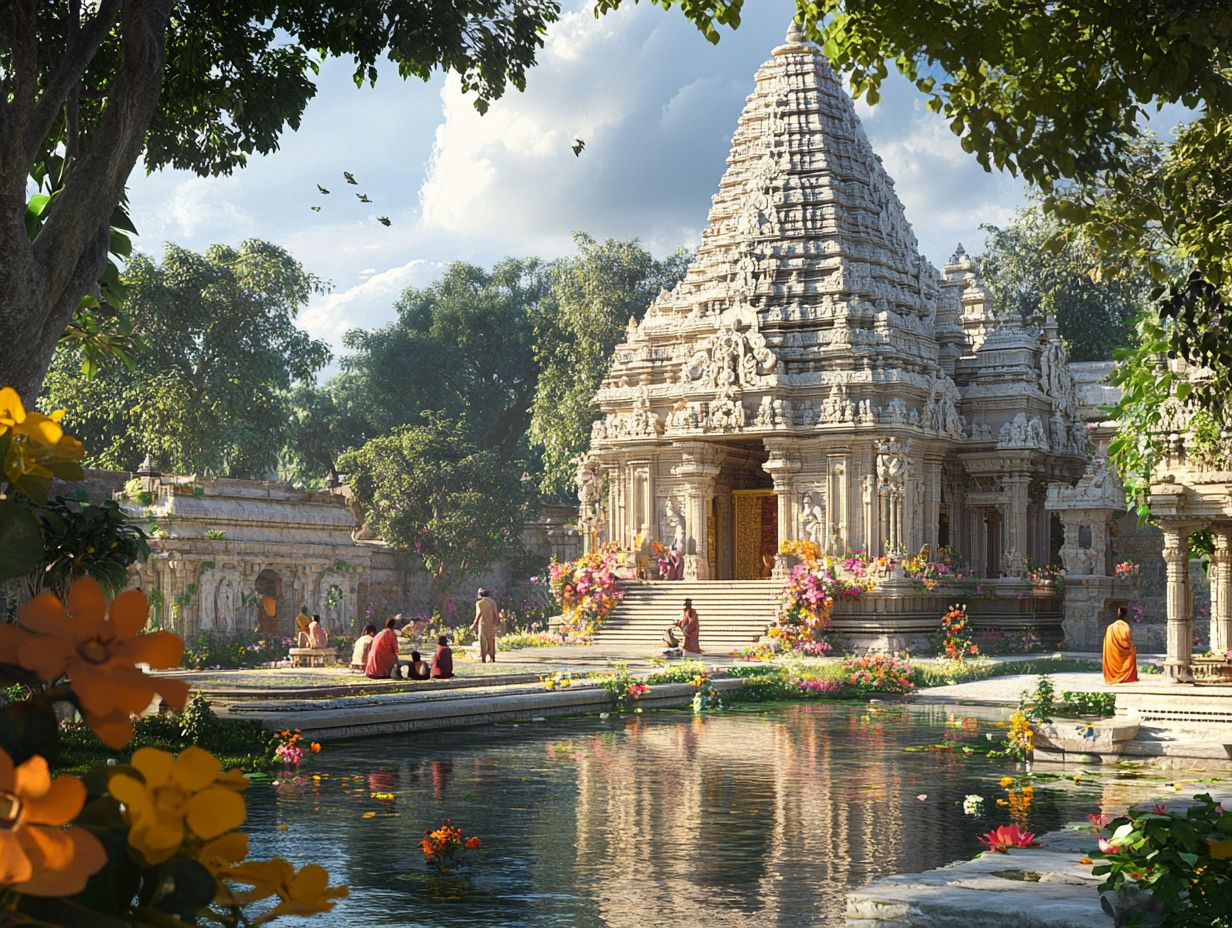How Does Hinduism Keep Society in Balance?
Hinduism, celebrated as one of the world’s most ancient religions, intricately weaves a rich tapestry of beliefs, rituals, and philosophies that profoundly influence both personal spirituality and societal structures. The sacredness of Hinduism is evident in its numerous festivals and rituals that mark various life stages and rites of passage.
This exploration delves into the origins of Hinduism, illuminating its core beliefs and the diverse pantheon of gods and goddesses revered by its followers. It further examines how Hindu principles, notably the caste system and dharma, play a significant role in shaping social harmony and addressing critical issues of justice and equality. The practices of meditation and yoga are also discussed as vital aspects of personal spirituality and psychological well-being.
The discussion also encompasses the criticisms and challenges that the religion encounters in contemporary society, while underscoring its lasting impact on social dynamics. This includes how Hinduism addresses existential questions and promotes ethical conduct through its teachings.
This journey invites readers to uncover the intricate relationship between Hinduism and the pursuit of social balance.
What Is Hinduism?

Hinduism stands as one of the world s oldest religions, distinguished by its intricate tapestry of spirituality, diverse beliefs, and a wealth of sacred texts, including the Vedas, Upanishads, and the Bhagavad Gita. These texts not only provide moral guidance but also offer a comprehensive framework for individuals to comprehend their place within the cosmos.
Hinduism stands as one of the world s oldest religions, distinguished by its intricate tapestry of spirituality, diverse beliefs, and a wealth of sacred texts, including the Vedas, Upanishads, and the Bhagavad Gita. These texts not only provide moral guidance but also offer a comprehensive framework for individuals to comprehend their place within the cosmos.
The religion’s complex amalgamation of values and traditions has profoundly shaped the lives of millions, underscoring the significance of family, community, and social responsibility in fostering societal harmony.
To truly grasp the essence of Hinduism, one must delve into its core concepts, practices, and the profound influence it exerts on various facets of life and culture across different societies. This includes understanding its sacred scriptures, guru traditions, and the role of ashrams in fostering communal living and spiritual growth.
How Did It Originate?
The origin of Hinduism presents a complex tapestry, intricately woven from a multitude of ancient practices, cultures, and philosophical ideas that have evolved over thousands of years. This evolution reflects the diverse social order and spiritual ideals inherent in Indian society. It also includes the development of religious symbolism and sacred geography, which play crucial roles in the cultural identity of India.
The origin of Hinduism presents a complex tapestry, intricately woven from a multitude of ancient practices, cultures, and philosophical ideas that have evolved over thousands of years. This evolution reflects the diverse social order and spiritual ideals inherent in Indian society.
The roots of this intricate development can be traced back to the Indus Valley Civilization, where early rituals and an agrarian society established the foundational stones for what would become a rich array of religious practices. Over the centuries, the amalgamation of Aryan traditions with indigenous beliefs significantly enriched this spiritual journey, culminating in the creation of sacred texts such as the Vedas and Upanishads, which are replete with profound philosophical insights.
Societal influences, including caste dynamics and regional customs, have played pivotal roles in shaping not only beliefs but also the cultural identity of numerous communities. Thus, the historical context of Hinduism reveals a resilient and adaptive tradition, one that continues to resonate deeply within contemporary Indian life.
What Are the Core Beliefs of Hinduism?
The core beliefs of Hinduism encompass fundamental concepts such as Dharma (duty), Karma (action and consequence), and the cycles of rebirth (samsara), which intricately guide adherents on their spiritual journeys toward moksha, or liberation from the relentless cycle of life and death.
These principles function as a moral compass, intricately shaping individual behaviors and societal norms, while fostering values of respect, compassion, and ethics that are essential for social cohesion.
What Are the Main Gods and Goddesses Worshipped in Hinduism?
Hinduism encompasses a rich pantheon of gods and goddesses, each embodying various aspects of the divine and playing significant roles in the spiritual lives of its practitioners. Deities such as Brahma, Vishnu, Shiva, and the Goddess Shakti are revered through a myriad of rituals and worship practices, including puja ceremonies.
Hinduism encompasses a rich pantheon of gods and goddesses, each embodying various aspects of the divine and playing significant roles in the spiritual lives of its practitioners. Deities such as Brahma, Vishnu, Shiva, and the Goddess Shakti are revered through a myriad of rituals and worship practices.
Brahma, as the creator deity, embodies the principles of creation and knowledge. Vishnu, known as the preserver, represents ideals of love and compassion, often descending to Earth in various avatars to restore cosmic order. Shiva, the destroyer, illustrates the eternal cycle of life, death, and rebirth, and is associated with transformation and meditation, guiding devotees in their understanding of the impermanence of the material world.
The Goddess Shakti, who symbolizes dynamic energy, is worshipped in a multitude of forms, underscoring the vital role of femininity in both creation and sustenance. This intricate interplay of divine archetypes fosters profound spirituality, encouraging adherents to engage in ritualistic practices that deepen their connection to the divine presence and guide them on their personal journeys toward enlightenment.
How Does Hinduism Influence Society?
Hinduism exerts a profound influence on society, intricately shaping social structures, community dynamics, and cultural traditions. It reinforces the significance of values such as respect, inclusivity, and moral integrity, which govern interpersonal relationships and foster overall social order and harmony within diverse communities.
What Are the Main Principles of Hinduism That Help Maintain Balance in Society?
The central principles of Hinduism Dharma, Karma, and the pursuit of ethical living serve as essential guiding tenets that uphold balance within society. They ensure that individuals fulfill their roles within the cosmic order while contributing to communal harmony and social responsibility. These principles also motivate individuals towards personal development and understanding their societal roles.
These foundational concepts promote unity among diverse groups by encouraging individuals to act in alignment with their duties and responsibilities. Dharma, representing moral and ethical obligations, instills purpose and direction in one’s actions, thereby fostering social order. Concurrently, the principle of Karma highlights the repercussions of one’s actions, serving as a poignant reminder of the interconnectedness between individuals and the broader community.
By acknowledging that their actions can influence others, individuals are inspired to engage in ethical living, ultimately nurturing an environment where compassion and respect flourish. In concert, these principles weave together to create a societal fabric that prioritizes collective well-being, reinforcing the significance of collaboration in the pursuit of a just and harmonious existence.
How Does the Caste System Play a Role in Maintaining Balance in Society?

The caste system, a longstanding social hierarchy within Hinduism, delineates various roles and responsibilities in society, with the theoretical intent of promoting balance and interdependence through the assignment of duties based on birth. However, the interpretation of this system has resulted in both community cohesion and significant social challenges. Modern movements advocating for social justice and equality continuously challenge the traditional beliefs associated with the caste system.
Originating from the ancient texts known as the Vedas, the caste system was initially structured to ensure a division of labor that would enable society to function smoothly. Each caste, or varna, was designed to address specific societal needs, thereby creating a framework that fostered cooperation among diverse groups.
Over the centuries, this once-functional structure has often been rigidly enforced, leading to discrimination and the perpetuation of inequality. In contemporary society, the caste system continues to provoke debate, as modern values increasingly clash with traditional beliefs. This tension has given rise to movements advocating for social justice and equality, challenging the deep-rooted dynamics that influence community interactions.
What Are Some Examples of Hinduism’s Influence on Society?
Hinduism’s influence intricately weaves through various facets of society, evident in the vibrant festivals, communal rituals, and family gatherings that characterize its practice. Additionally, the religion’s strong emphasis on charitable acts fosters social cohesion and reinforces cultural identity among its adherents, creating a rich tapestry of shared values and traditions that enrich community life. This is particularly evident in the festivals of light and harvest such as Diwali and Pongal.
Hinduism’s influence intricately weaves through various facets of society, evident in the vibrant festivals, communal rituals, and family gatherings that characterize its practice. Additionally, the religion’s strong emphasis on charitable acts fosters social cohesion and reinforces cultural identity among its adherents, creating a rich tapestry of shared values and traditions that enrich community life.
How Does Hinduism Promote Social Harmony and Unity?
Hinduism fosters social harmony and unity by emphasizing respect for diversity, encouraging tolerance among various beliefs, and nurturing a sense of community through shared rituals and values that connect individuals. This ancient tradition celebrates the uniqueness of different perspectives, paving the way for a multicultural society where all voices are esteemed.
The practice of collective worship, exemplified by festivals such as Diwali and Holi, demonstrates how communal participation cultivates a sense of belonging and mutual respect among participants. Sacred texts like the Bhagavad Gita underscore the significance of understanding over judgment, promoting peaceful coexistence within a richly diverse landscape.
Through these mechanisms, individuals are motivated not only to coexist but also to embrace the richness of varied identities, thereby fortifying social cohesion within their communities. The tradition of seva, or selfless service, further encourages community service and charitable acts, strengthening the bonds of unity.
Hinduism fosters social harmony and unity by emphasizing respect for diversity, encouraging tolerance among various beliefs, and nurturing a sense of community through shared rituals and values that connect individuals. This ancient tradition celebrates the uniqueness of different perspectives, paving the way for a multicultural society where all voices are esteemed.
The practice of collective worship, exemplified by festivals such as Diwali and Holi, demonstrates how communal participation cultivates a sense of belonging and mutual respect among participants. Teachings derived from sacred texts like the Bhagavad Gita underscore the significance of understanding over judgment, promoting peaceful coexistence within a richly diverse landscape.
Through these mechanisms, individuals are motivated not only to coexist but also to embrace the richness of varied identities, thereby fortifying social cohesion within their communities.
How Does Hinduism Encourage Charity and Giving Back to Society?
Hinduism advocates for charity and societal contribution through the practice of ‘seva’, encapsulating selfless service and compassion for others. This principle reinforces the ethical responsibility of individuals to positively impact their communities. Activities like community service and environmental ethics are embedded within Hindu practice, promoting holistic well-being and respect for life.
Hinduism advocates for charity and societal contribution through the practice of ‘seva’, encapsulating selfless service and compassion for others. This principle reinforces the ethical responsibility of individuals to positively impact their communities.
Seva transcends mere acts of kindness; it represents a profound philosophy that encourages individuals to engage meaningfully with their surroundings and uplift those in need. By prioritizing altruistic actions over personal gain, this practice nurtures a sense of interconnectedness among community members, promoting compassion and charity.
In a broader context, community service inspired by seva can catalyze transformative societal changes, addressing pressing social issues such as poverty and inequality, promoting social justice and communal living in the process.
Ultimately, embracing this principle underscores the essential role that charity plays in fostering empathy, solidarity, and a spirit of collective responsibility elements that are crucial for the cultivation of harmonious societies grounded in ethical conduct and spirituality.
What Are the Effects of Hinduism on Gender Roles and Equality in Society?
The effects of Hinduism on gender roles and equality in society present a complex tapestry, as traditional values and cultural values often prescribe distinct roles for men and women. In contrast, contemporary interpretations advocate for enhanced equality and enablement of women within the framework of Hindu teachings and religious practices.
This dichotomy not only underscores the challenge of reconciling age-old beliefs with modern ideologies but also illuminates a growing trend among practitioners to reinterpret sacred texts and rituals in ways that foster inclusivity, tolerance, and respect. Many individuals today are actively challenging the rigid structures that have historically relegated women to domestic and submissive roles, striving for gender equality and empowerment.
As society progresses, the movement for gender equality within Hinduism is gaining significant momentum, prompting a re-evaluation of customs and societal roles that have perpetuated inequality.
This shift signifies a broader societal transformation that seeks to honor both tradition and the fundamental rights of all individuals, reflecting a nuanced understanding of cultural values and social order.
How Does Hinduism Address Social Issues and Conflicts?
Hinduism engages with social issues and conflicts through its profound teachings on justice, equality, and individual moral responsibilities. It advocates for peaceful coexistence and a harmonious society, underscoring the significance of compassion and ethical living as foundational principles for addressing societal challenges and maintaining social harmony.
What Are Some Hindu Teachings on Social Justice and Equality?

Hindu teachings on social justice and equality are anchored in the principle of Dharma, which underscores the importance of ethical living and recognizes the intrinsic value of every individual. This philosophy advocates for fairness and respect across all layers of society.
This profound understanding is deeply rooted in ancient texts such as the Bhagavad Gita and the Manusmriti, which illuminate the moral responsibilities that individuals bear toward one another. Within these writings, the concept of Sewa, or service, emerges as a foundational element, urging followers to act selflessly and contribute to the welfare of the collective, fostering social cohesion and community service. Moreover, the emphasis on Ahimsa, or non-violence, highlights the essential role of compassion in confronting societal injustices and promoting non-violence.
By embracing these ethical teachings, adherents are inspired to cultivate an inclusive community where diversity is celebrated and every voice is heard, fostering unity and diversity. In doing so, they align themselves with the higher ideals of justice and equality that lie at the heart of Hindu philosophy, promoting ethical conduct and spiritual growth.
How Does Hinduism Promote Peace and Non-Violence in Society?
Hinduism advocates for peace and non-violence through the principle of ‘ahimsa’, which embodies compassion and respect for all living beings. This doctrine serves as a fundamental pillar for ethical conduct and harmonious coexistence within society, promoting social harmony.
Ahimsa not only calls for the avoidance of harm towards others but also encourages individuals to nurture a mindset that fosters understanding and empathy, ensuring psychological well-being. By embracing these ideals, one can create a ripple effect that reshapes societal norms, cultivating a culture grounded in mutual respect and harmony, reflecting divine order.
Individuals who embody ahimsa in their daily lives often inspire those around them to reflect on their actions and choices, leading to transformative changes that favor cooperation over conflict and promote peaceful coexistence. Ultimately, the practice of ahimsa can pave the way for a more compassionate world, where the pursuit of peace becomes a shared responsibility among all members of society, ensuring social harmony.
What Are Some Criticisms of Hinduism’s Influence on Society?
Critiques of Hinduism’s impact on society frequently center around the caste system, gender roles, and the perceived inequalities that have arisen from its traditional practices and societal norms.
These discussions open up significant dialogues regarding the religion’s capacity for adaptability and its relevance in modern contexts, reflecting on spiritual growth and intercultural dialogue.
How Has Hinduism Been Misinterpreted or Misused in Society?
Hinduism has frequently been misinterpreted or misappropriated in societal contexts, with certain ideologies extracting elements of the religion out of context to rationalize social and political conflicts. This distortion significantly undermines the core teachings of peace and unity that are intrinsic to Hindu philosophy and ethical conduct.
Such misrepresentations not only diminish the profound philosophical heritage embedded in Hindu scripture but also exacerbate divisions among communities, impacting social cohesion and communal living. For instance, the selective interpretation of pivotal concepts such as Dharma and Karma can be manipulated to justify the marginalization or aggression against specific groups, affecting social order. These misapplications foster societal tensions, overshadowing the religion’s fundamental messages of compassion and inclusivity and religious tolerance.
The consequences of these distorted perspectives are profound, as they breed animosity and, in some cases, precipitate violent confrontations, diverting attention from the harmonious coexistence that Hindu teachings ideally advocate.
What Are Some Challenges Hinduism Faces in Maintaining Balance in Society?
Hinduism encounters a myriad of challenges in its quest to maintain societal equilibrium, particularly amid the forces of modernization, globalization, and the shifting social norms that advocate for inclusivity and the adaptation of ancient traditions to contemporary life.
As younger generations increasingly engage with diverse cultures and values, they often find themselves in a delicate balance between honoring traditional practices and embracing more progressive ideologies, promoting intercultural dialogue. This duality creates a unique conundrum, leading to the potential for generational rifts within communities, affecting social cohesion.
The crux of the challenge lies in cultivating an environment that respects the profound richness of Hindu customs while simultaneously welcoming change and promoting inclusiveness, ensuring cultural identity. The swift pace of technological advancement further accentuates these transitions, compelling adherents to reevaluate long-standing beliefs and rituals, reflecting on existential questions.
By adeptly navigating these complexities, Hinduism can discover pathways to remain both relevant and resonant in the modern world.
Frequently Asked Questions
How does Hinduism promote harmony and balance within society?

Hinduism promotes harmony and balance within society through its teachings and practices, which focus on the importance of respect, compassion, and duty towards others, ensuring social harmony and balance.
What role does the caste system play in maintaining balance in Hindu society?
The caste system, although often criticized, is seen as a way to maintain social order and balance by assigning specific roles and duties to individuals based on their birth, ensuring societal norms and social cohesion.
Does Hinduism prioritize individual or societal well-being?
Hinduism emphasizes the importance of both individual and societal well-being. It teaches that individuals should strive for personal growth and fulfillment, but not at the expense of causing harm or imbalance to society, promoting psychological well-being and inner peace.
How does the concept of dharma contribute to a balanced society in Hinduism?
Dharma, or the duties and responsibilities of an individual, is seen as a crucial aspect of maintaining balance in Hindu society. It encourages individuals to fulfill their duties towards themselves, their families, and their community, leading to a balanced and harmonious society, promoting social cohesion and ethical conduct.
What practices does Hinduism promote to maintain balance in society?
Hinduism promotes various practices such as ahimsa (non-violence), seva (selfless service), and satsang (community gatherings) that promote empathy, compassion, and unity within society, leading to a balanced and peaceful coexistence, ensuring societal balance.
How does Hinduism address social issues and conflicts within society?
Hinduism teaches the concept of karma, which emphasizes that one’s actions have consequences. This belief encourages individuals to be mindful of their actions and to strive for peaceful resolutions in conflicts, ultimately contributing to a balanced and harmonious society, fostering social harmony and ethical conduct.
